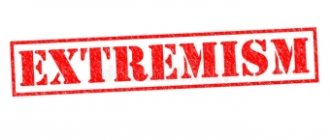Thank you for your help in preparing the instructions to the Director of Information and Analytical Alexander Verkhovsky
On June 9, the Moscow City Court recognized FBK, the Foundation for the Defense of Citizens' Rights (FZPG) and Navalny's headquarters as extremist organizations. Natural questions arose about what to do for those who supported their activities in one way or another. Legislation regarding extremism is one of the most vague in Russia - almost not a single question can be answered with a 100 percent guarantee. But we have collected all the useful information from the laws, the positions of the higher courts and the practice of law enforcement agencies (which often directly contradicts the letter of the law) to make it easier for you to decide what you can and cannot do.
What does the status of an extremist organization mean?
Inclusion in the list of extremist organizations entails the following consequences for their organizers and employees:
- liquidation of organizations, as well as a ban on the continuation of their activities under threat of criminal liability (Part 2 of Article 282.2 of the Criminal Code for participants and Part 1 of Article 282.2 of the Criminal Code for organizers). It is important that criminal charges can only be brought against employees if they continue the activities of the organization;
- prohibition of any banking activities;
- prohibition to disseminate information about the organization in the media and the Internet;
- ban on participating in elections and referendums;
- prohibition on convening meetings or organizing the recruitment of new members;
- ban on organizing and holding public events.
National extremism
National extremism is based on inciting interethnic hatred and enmity, manifesting itself in regional wars and conflicts, and acts of genocide. It comes from the position of protecting “one’s nation”, its economic interests, political rights, language and cultural values to the detriment of representatives of other nationalities located in the same territory. Regional confrontations and clashes on an ethnic basis have become an objective threat to the modern world.
Nationalism is dangerous, it opposes democracy, and threatens the individual’s right to self-identification. In the global community, polarization between rich and poor countries leads to the rise of nationalism. This is expressed in the desire of developed countries for national isolation, and of developing countries for gaining national independence.
Islamic extremism is of particular concern to the world. Its leaders attract supporters with imaginary simplicity - a return to the past, stagnation, retreat to Sharia, blaming the countries and peoples of the North, the “infidels”, i.e., for the troubles of the peoples of Islam. external enemy.
Is the decision retroactive?
In terms of liability, the court's decision does not have retroactive effect - supporting FBK until the moment the fund was recognized as an extremist organization cannot be considered criminal. There are criminal risks after an organization is included in the list of extremist organizations on the Ministry of Justice website - this happens after the decision comes into force (after an appeal), but not necessarily immediately.
As for old publications in support of FBK, there is some confusion. The Supreme Court ruled that the crime of speech is complete once the speech is published. That is, strictly speaking, the statute of limitations begins to run from this moment. However, it cannot be said that law enforcement agencies will apply Part 2 of Art. 282.2 of the Criminal Code (participation in an extremist organization). Quite the contrary: there is a practice when authorities dug into ancient publications of social network users (even 10 years ago). Therefore, it is better to delete such publications after the court decision comes into force.
"Retroactive" refers to restrictions on political activity: former supporters will not be able to participate in elections for several years (see below).
When do the bans come into force?
Immediately after suspension (that is, now) you cannot:
- participate in the activities of FBK and headquarters. What is “participation” in the concept of law enforcement, see below;
- administrative liability is provided for this under Art. 20.28 Code of Administrative Offenses of the Russian Federation. Punishment is a fine of up to 1000 rubles. In practice, this article is rarely used. There is no criminal liability.
The law states that a decision to recognize an organization as extremist comes into force immediately. But it immediately comes into force for the organization itself. For other citizens it is unclear. The Supreme Court clarified that responsibility for participation in an extremist organization (Article 282.2 of the Criminal Code) occurs only after the organization is included in the appropriate list of the Ministry of Justice. It is logical that the same applies to other restrictions - but there is no guarantee. In any case, the attention of law enforcement agencies is possible at any stage (visits, calls to the police, etc.). There is a known practice when, because of donations from FBK, people were summoned for questioning even before the decision of the Moscow City Court.
Restrictions on political activity
On June 4, 2022, a law was adopted prohibiting persons involved in the activities of extremist organizations from participating in elections:
- the ban applies to any elections, not just Duma ones;
- founders and leaders cannot be elected for five years from the moment the organization is banned, and members and others involved in its work cannot be elected for three years.
The following is considered to be involvement in the activities of extremist organizations:
- statements (including on the Internet) in support of an extremist organization or its individual event;
- transferring money to an extremist organization or its individual event;
- organizational, advisory or other assistance to an extremist organization or its individual event.
The court will determine involvement.
Ultra-left extremism, its manifestations
Ultra-left extremism and terrorism are political and social phenomena that are expressed in the directed activities of certain active groups of society or individuals to achieve the following tasks:
- destroy the existing government system;
- build, in their opinion, a more just society , applying socialist-communist concepts, as well as modern left-wing extremist doctrines.
Far-left terrorism is a special type of left-wing extremism, manifested in the struggle of armed groups or individuals acting on the basis of internal beliefs. Their goal is to destroy the state system and the integrity of civil society through the physical elimination of representatives of government bodies and mass intimidation of the population.
It reaches its extreme expression in religious fundamentalism.
Terrorist threats have acquired global significance in their scope.
Can an account be blocked without a trial?
According to the law, without a trial they can block a resource with “calls for extremist activities” (forcibly changing the foundations of the constitutional system, inciting racial, religious hatred, etc.). The Prosecutor General of the Russian Federation or his deputies will decide what constitutes a “call to carry out extremist activities.” There is an extensive practice of extrajudicial banning of pages with materials from banned organizations simply because they belong to banned organizations. In addition, in practice, materials recognized as extremist in court can be blocked without trial if the decision to block these materials or similar ones was previously made in relation to some other resource.
There are no legal grounds or any significant practice of extrajudicial blocking of posts with symbols and words of support for an extremist organization.
If the material seems like an appeal to the authorities, then telecom operators, on the instructions of Roskomnadzor, will block the site or page immediately - they will unblock it only after the material is removed and Roskomnadzor is notified about it. The hoster will first offer to delete a publication that contains extremist materials. If you do not want the material removed, you can appeal this requirement in court.
It's a little different with social media accounts. Facebook or Twitter do not always remove posts on the orders of Roskomnadzor; they will only block content if it violates their own rules. But if the publication was on VKontakte, there is a high probability that the administration will follow the instructions of Roskomnadzor. If a post or an entire account is blocked by the social network administration, you will either have to negotiate to restore the account or create a new one.
What can and cannot be done?
Before answering this question directly, we suggest that you familiarize yourself with the list of “extremist” articles that you need to know in order to understand the context. A lot of them:
- Part 1.1 of Article 282.2 of the Criminal Code (involvement in the activities of an extremist organization);
- Part 2 of Article 282.2 of the Criminal Code (participation in the activities of an extremist organization);
- Article 280 of the Criminal Code (public calls for extremist activities);
- Part 1 of Article 282.2 of the Criminal Code (organizing the activities of an extremist organization);
- Article 282.3 of the Criminal Code (financing the activities of an extremist organization);
- Part 2 of Article 13.15 of the Code of Administrative Offenses (mention of an extremist organization without labeling);
- Article 20.3 of the Code of Administrative Offenses (publication of symbols of an extremist organization - those contained in the organization’s constituent documents);
- Article 20.29 of the Code of Administrative Offenses (distribution of extremist materials - that is, those materials that are recognized as extremist by a court decision).
This list deliberately does not include Articles 282 of the Criminal Code and 20.3.1 of the Code of Administrative Offenses (incitement of hatred or enmity), because they are not relevant to the issues under consideration.
Also keep in mind that liability for involvement in extremism is not limited to just a prison sentence or a fine. If we are talking about a criminal article, the person may also be included in the Rosfinmonitoring list of extremists. Banks block the accounts of those caught up in it - people cannot get a job, take out a loan or make any transactions using the card. At the same time, you can get into the register without a court verdict if there is a resolution recognizing a person as a suspect or a decision of departments (the Prosecutor General's Office, the Investigative Committee, the Ministry of Internal Affairs or the Ministry of Foreign Affairs).
Participation
For participation in the activities of an organization that is recognized by the court as extremist, one faces criminal liability under Part 2 of Art. 282.2 of the Criminal Code - punishment up to six years. The Supreme Court interprets the concept of “participation” broadly - as “the commission by a person of deliberate actions aimed at achieving the goals of an extremist organization” (paragraph 20 of the Resolution of the Plenum of the Armed Forces of the Russian Federation No. 11 in Moscow “On judicial practice in criminal cases of extremist crimes”). This may include any assistance, including on a volunteer basis: distributing leaflets, assistance in organizing and holding events, conducting conversations for the purpose of “propaganda” of the activities of a banned organization, participation in the organization’s events. These may include meetings with the participation of obvious activists of banned organizations, especially if the meeting discussed politics and mentioned these organizations or something related to them. And if you participate in organizing such a meeting, you may end up being an “organizer” within the meaning of Part 1 of Art. 282.2 of the Criminal Code (punishment up to 10 years in prison) - even if you had no connection with an “extremist” organization before.
It is important to stipulate that continuation of activities can be understood broadly - in particular, people can gather under a different sign, but the authorities will still decide that this is a continuation of the activities of a banned organization - there have been such precedents. There are also risks in relation to projects that FBK previously led. For example, you cannot guarantee that you will not be attacked for (re)posts with open calls for “Smart Voting” (though you can, of course, vote in accordance with it).
For conviction under Art. 282.2 of the Criminal Code, the listed actions are sufficient. The commission of any other offense in connection with such participation is not required.
In addition, for the involvement of new participants, you can face up to eight years under Part 1.1 of Art. 282.2 of the Criminal Code. The Supreme Court recognizes persuasion or involvement as persuasion, bribery, threats, persuasion, requests and proposals, search for persons (clause 15.1 of the Resolution of the Plenum of the Armed Forces of the Russian Federation No. 11 in Moscow “On judicial practice in criminal cases of extremist crimes”). Moreover, such a crime is considered completed from the moment it is committed, regardless of whether it was actually possible to “involve” another person, or whether the person involved took part in the activities of the corresponding extremist association. That is, they are held accountable for the very attempt to involve another person.
Participation in rallies
If FBK and Navalny’s headquarters are recognized as extremist organizations, they will no longer have the right to hold public events. For participation in events held by them, they may face not only administrative, but also criminal liability - this also falls under Part 2 of Art. 282.2 of the Criminal Code (clause 20 here).
Serious risks also exist for those who “call” for such events, including by reposting messages about FBK events - this will result in up to eight years in prison under Part 1.1 of Art. 282.2 of the Criminal Code.
Donations
After the decision comes into force and FBK and Navalny’s headquarters are included in the Ministry of Justice list, any transfer of money will be equated to “financing extremist activities.” The amount of the transfer is not important: at least 10 rubles, at least 10 thousand. Any amount transferred will be considered a crime under Art. 282.3 of the Criminal Code of the Russian Federation (financing extremist activities). Punishment is a fine, or forced labor, or restriction of freedom, or imprisonment for a term of three to eight years.
There are risks that payment to a third-party project of FBK or an organization with a different name will also be considered financing of an extremist organization.
A bank transfer from Russia will be easy to prove. Donors can be included in the blacklist of Rosfinmonitoring as people financing extremist activities, after which bank accounts and access to any financial services are blocked. The same thing happens with anyone convicted under a criminal extremist article (and sometimes, if the investigation wishes, even with a suspect or accused during the investigation).
Publication of symbols
If an organization is recognized as extremist, publication of its official symbols is prohibited. If it is published, it will be an administrative offense. Punishment for citizens is from one to two thousand rubles or arrest for up to 15 days, as well as a ban on being elected to government bodies for a year (Article 20.3 of the Administrative Code). The exception is the publication of such symbols with a reservation about the condemnation of the corresponding ideology.
However, the official symbols are not any images associated with the organization, but the symbols that are described in the constituent documents of the banned organization (Clause 4, Article 1 of the Federal Law “On Combating Extremist Activities”). FBK and its headquarters do not have such official symbols.
There is no formal liability for the publication of other symbols. However, in practice there were cases of persecution under Art. 20.3 of the Administrative Code for publishing unofficial symbols of the banned terrorist organization Hizb ut-Tahrir al-Islami.
In addition, if other symbols are recognized as extremist materials by a separate, special court decision, then their publication will result in liability under Art. 20.29 Code of Administrative Offences.
There is no special increased liability under this article for repetition. But if the publication occurs systematically and is associated with other activities in support of an extremist organization, there are risks under the article for participation (Part 2 of Article 282.2 of the Criminal Code).
Posts and reposts
Reposts of messages from FBK or Navalny's headquarters
It is definitely not possible to repost those materials that are recognized as extremist by a separate court decision. Such materials are included in the list of the Ministry of Justice - you can check it. Responsibility for publication is a fine of one to three thousand rubles or administrative arrest for up to fifteen days with confiscation of the specified materials and equipment used for their production (Article 20.29 of the Administrative Code).
It is more difficult with materials not included in the Ministry of Justice list. Experts believe that the publication of documents, policy articles, projects and statements by the leaders of such organizations can be considered a form of participation in activities (Part 2 of Article 282.2 of the Criminal Code) - at least if it is a systematic publication. In any case, close attention from law enforcement agencies to you after such reposts is highly likely.
In addition, there will be extremely high criminal risks for reposting calls for actions organized by FBK - see below.
Posts in support
There are no direct prohibitions on writing in support of organizations recognized as extremist. There is also no criminal article for justifying extremist activity (unlike justification of terrorist activity - Article 205.2 of the Criminal Code).
However, there are gray areas in the legislation: Art. 280 of the Criminal Code (calls for extremist activity) and Part 2 of Art. 282.2 of the Criminal Code (participation in an extremist organization), which, if desired, can be interpreted very broadly.
In the Stavropol Territory, a VKontakte user was accused of participating in the banned extremist organization Misanthropic division, who “conducted conversations with users of this social network in order to promote the activities of this extremist organization, aimed at praising, justifying, approving its ideology, and also demonstrated by publishing graphic images on your user page.” Probably, it was about systematic publications in support of the organization on a social network.
At the same time, there was no practice of bringing to criminal liability for just one post in support of an extremist organization (as is the case with Article 205.2 of the Criminal Code).
Problems can only arise with public statements. At the same time, any statement on the Internet (comments and posts on social networks and websites, blogs, etc.) can be considered “public”. Even statements “for friends only” on social networks or sent by e-mail to a sufficiently large number of people have already been repeatedly recognized as public.
Petitions in support of organizations made or signed after a court decision may also result in, if not criminal liability, then at least visits and close attention from law enforcement agencies.
Is it possible to repost or write in support of Alexei Navalny? Or former members and management of FBK?
Can. But only if this cannot be considered as a call for actions taken by a prohibited organization. For example, if Leonid Volkov calls for a rally or “Smart Voting,” the court could theoretically consider this a continuation of the activities of the headquarters. Then a repost or your own call for such an action can be considered a form of participation. This is still a theory: in practice Art. 282.2 of the Criminal Code has never been used so cunningly.
Just mentions
Simply mentioning an extremist organization is okay. However, it is necessary to indicate that the organization has been liquidated and its activities are prohibited (Part 2 of Article 13.15 of the Administrative Code). This rule applies to both the media and ordinary citizens and organizations. Although in practice this article so far applies only to the media.
The punishment for citizens is a fine of up to two thousand five hundred rubles with confiscation of the subject of the administrative offense. The “subject of the offense” is a leaflet or poster, but not a laptop or phone. In addition, confiscation is carried out only after the court decision has entered into force. Punishment for officials is a fine of four to five thousand rubles with confiscation of the subject of the administrative offense; for legal entities - a fine of 40-50 thousand rubles with confiscation of the subject of the administrative offense.
There is no special liability for repetition.
Likes
No, they cannot prosecute people for liking. Even the Supreme Court pointed this out. There is a known case when they tried to bring to justice an activist who liked a photo with Nazi symbols on VKontakte (a still from the film “American History X” with Edward Norton) - however, this was back when on VKontakte, when you clicked like, the picture was automatically ended up on the user’s wall in one of the albums - that is, in essence, they were charged with reposting. As a result, the person was brought to administrative responsibility under Art. 20.3 of the Administrative Code with a fine of one thousand rubles.
Comments
Yours : the same rules as with posts.
Not yours : you cannot be held responsible for the words of others, even those made under your post. Demands to delete other people's comments under a post are illegal, unless we are talking about the media. In practice, there were cases when they tried to attract the author of the post, but this was due to the fact that the investigation made a mistake and mistook someone else’s comment under the post for the author’s comment.
Groups and subscriptions
Unclear. On the one hand, the law does not prohibit being a member of public pages and groups, or subscribing to a mailing list organized by an extremist organization - this is not the distribution of their materials, nor calls for extremist activity. There is no practice of holding people accountable for one participation in a group or subscription. On the other hand, participation in groups on VKontakte was more than once understood by the court precisely as a form of participation in something, and not as a tendency to read something. Close attention from law enforcement is possible. The risks will increase if you otherwise write about or publicly endorse an organization.
The concept of extremism
In the legal aspect, the word “extremism” was first used at the beginning of the 20th century by the French lawyer M. Leroy, as a designation of fanatical belief in a political ideal, as something extreme, excessive and inhumane.
Extremism is a direct negative continuation of the socio-economic, social, political, and cultural contradictions of society.
Extremism can be considered as an ideology based on the forced illegal dissemination of one’s beliefs, intolerance towards opponents, aimed at their violent suppression in order to cause a public outcry.
The legal basis for countering extremism and terrorism in Russian legislation is:
- Constitution of the Russian Federation;
- Federal Law of March 6, 2006 “On Combating Terrorism”;
- Federal Law of August 7, 2001 “On combating the legalization (laundering) of proceeds from crime and the financing of terrorism”;
- Federal Law of July 25, 2002 “On Combating Extremist Activities”;
- Criminal Code of the Russian Federation;
- Code of Administrative Offenses of the Russian Federation;
- other legislative acts and introduced amendments and additions.






